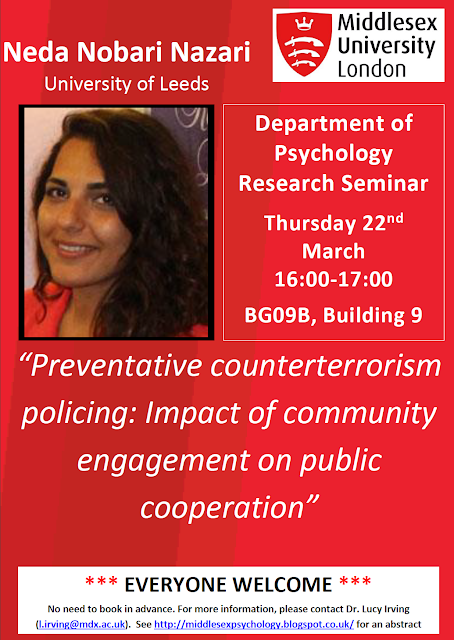*** Everyone
Welcome! No need to book in advance***
Date: Thursday 4th October 2018
Time: 12:00-13:00
Room: Building 9 BG09A
Dr Teresa D’Oliviera (Kings College London)
Date: Thursday 4th October 2018
Time: 12:00-13:00
Room: Building 9 BG09A
Dr Teresa D’Oliviera (Kings College London)
Abstract:
The presentation
starts by describing the state of the art in the study of circadian stress and
fatigue and highlights the relevance of combining psychological, behavioural
and physiological markers in workplace interventions. It is proposed that the
integration of multidisciplinary approaches and the agreement regarding the
markers to be adopted are instrumental to a movement from research and practice
emphasizing tertiary perspectives to the development of initiatives focusing on
prevention and promotion of recovery.
The presentation reports on preliminary results of a project designed to explore the repercussions of circadian stress on cabin crew both from short haul (SH) and long haul (LH) flight focusing on:
- The differences between fatigue levels before and at the end of a regular working day (i.e., neuroendocrine and psychological markers)
- The differences between different fight operations (i.e., LH and SH crews with neuroendocrine and psychological markers).
The preliminary
results of the project are discussed and the relevance of a multidisciplinary
approach to recovery management and circadian stress is highlighted.
Biography:
I am an Organisational Psychologist with a First-class
degree (BSc + MSc) degree in Psychology, a MSc in Organisational Behaviour and
a PhD in Applied Psychology.
My professional activities started as a Human
Resources Specialist in banking services and later as an academic in the domain
of work an organisational psychology.
My primary research
objectives are directed towards understanding the interface between work and
working conditions and the improvement of individual well-being, health and
performance. Recent activities have considered the potential contributions from
biological psychology and behavioural medicine and the development of
organisational neurosciences. I am particularly interested in exploring the
potential combinations of physiological markers (e.g., neuroendocrine and
immune responses, sleep data) with a psychological approach (e.g., fatigue,
task complexity, task autonomy) and organisational data (e.g., work schedules,
teamwork) to workplace results and individual health and well-being.
Current research
activities focus on occupational stress, fatigue and health (i.e., circadian
stress, sleep deprivation and recovery, job characteristics and sleep hygiene)
and the development of interventions that help promote physical and
psychological well-being and health.



